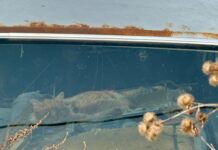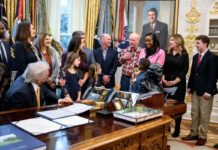The holidays are a time to indulge and give in excess. However, that’s not always a good thing for the environment. In fact, Americans create 25 percent more waste from Thanksgiving to New Year’s Day.
Fortunately, we can recycle, repurpose or reuse about 80 percent of what we would normally throw out during the holidays. Keep the spirit of Christmas going, promote good will towards men and learn to be a better recycler.
What can you recycle?
During the holidays, there are a lot of extra packages, packing materials and food-related products we don’t handle regularly. It can make determining what can go into your recycling container more challenging. Use the tips below to simplify the process.
Paper products and cardboard
Recycle
- Flattened cardboard
- Newspaper
- Magazines
- Office paper
- Wrapping paper
- Paper gift bags
Tips
- Make sure you don’t put anything in your recycling bin that’s been contaminated with food, liquid or other waste. Once cardboard or paper products come into contact with food or liquid, it can’t be recycled.
- Make sure the lid of your recycling bin is tightly closed to seal out moisture. You should never allow more than one teaspoon of liquid to remain in your recycling bin.
- Separate packaging made of mixed materials. For example, many cardboard boxes that toys come in have plastic windows. Before putting the packaging into your recycling bin separate the plastic window from the cardboard backing. When materials are connected they can’t be recycled as is, even if they are made up of all recyclable material.
- Some items, such as sticky gift tags, may be too small to be recycled by themselves. However, they can be recycled if they’re still stuck to an envelope, wrapping paper or paper gift bag.
Metal cans
Recycle
- Soda cans
- Canned food cans without insulated coating
Tips
- Remove any paper or plastic labels before putting food or drink cans into your recycling bin.
- Always make sure to clean out any residual food materials, so they don’t contaminate other items in your recycle bin.
- After you rinse your recyclable cans, let them dry out before placing them into your recycling bin.
- Throw out metal cans with insulated coating. They are not recyclable.
Plastic
Recycle
- Water bottles
- Milk jugs
- Laundry detergent containers
- Juice bottles
- Eggnog containers
- Flavored creamer containers
- Other hard plastic containers
Tips
- Most plastic drink containers come with lids that are too small to recycle by themselves. Put these lids back on their respective containers to recycle them.
- Make sure to give your plastic drink containers a good rinse and let them dry before placing them in your recycling bin to reduce contamination from food and liquids.
- If you’re unsure whether or not a plastic item can be recycled use the poke test: if you can poke your finger through the plastic it can’t be recycled curbside.
Do NOT recycle
Somethings require special handling and cannot be recycled curbside. Here’s a list of items that don’t belong in your recycling container:
- Bubble wrap
- Styrofoam
- Plastic bags
- Metal cans with an insulated coating
- Padded envelopes
- Ribbons
- Bows
- Packing peanuts
- Foil or glittery wrapping paper
- Soiled or wet materials.
- Trash
- Connected or mixed materials
Key recycling tips
- Always make sure recyclables are empty of their original contents, clean of any residue and dry before they are placed in your recycling container.
- Always separate mixed materials before putting them in your recycling bin. Materials that are connected — like the cardboard boxes with plastic windows that toys come in — cannot be recycled as is, even if all the materials are recyclable. If only part of an item with mixed material is recyclable, separate the materials and only put the recyclable portion into your bin.
- Never bag or bundle your recyclables. Plastic bags are not recyclable and should be kept out of your recycling bin. Additionally, bundled items can’t be sorted at a recycling facility and will be thrown out anyways. Always place recycling items in your bin individually.
- Don’t use your recycling bin as an overflow trash can.










